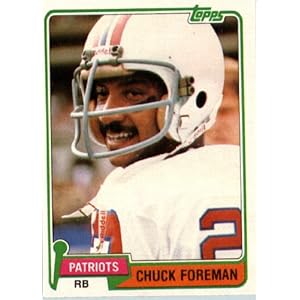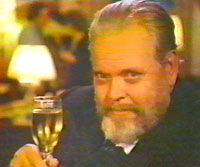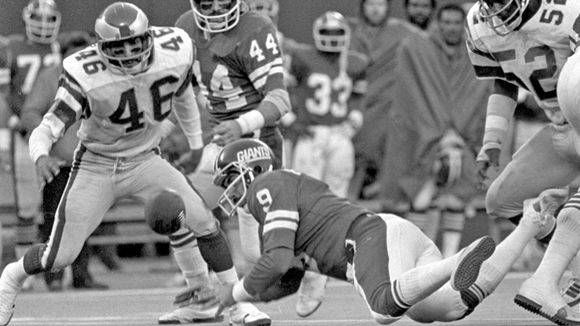
Patriots vs. Dolphins at the Orange Bowl, December 8, 1980
This was a fairly desultory affair for a Monday Nighter, with a quarterback matchup pitting David Woodley against Matt Cavanaugh, and not a whole lot happened till the end. The Patriots, I had long since forgotten, had added Chuck Foreman as a third-down back, and for some bizarre reason, every time Foreman appeared in the game, Howard Cosell loudly wondered why in the world the Pats weren’t using him more often. I guess he could empathize with a faded big name who was clearly no longer capable of getting the job done.
Foreman was totally washed up at this point; having lost his job as the Vikings’ starting running back in 1979, when he gained 223 yards at an average of just 2.6 yards a pop. This would be the last NFL game of his career. The Patriots also had Harold Jackson on the roster, in an apparent attempt to reunite the 1975 NFC Pro Bowl team.
One of the best things about the tape I watched was that the commercials were intact. I always prefer to have the commercials on the games I watch, to provide the full cultural context of the moment. I particularly enjoy seeing which celebs were endorsing products at that point: Here we have Orson Welles for Paul Masson wines, Suzanne Somers for Ace Hardware, Bruce Jenner for Minolta. Unfortunately, I didn’t notice any future stars working their way up in the business, though.
 The absolute pinnacle in this regard was the 1970 NFC Championship between the Cowboys and the 49ers, which featured an up-and-coming Vic Tayback for Edge and a down-and-outing Rod Serling for Ford. Seeing the Ford spot really made you appreciate what yeoman work the Twilight Zone staff did on trimming Serling’s eyebrows.
The absolute pinnacle in this regard was the 1970 NFC Championship between the Cowboys and the 49ers, which featured an up-and-coming Vic Tayback for Edge and a down-and-outing Rod Serling for Ford. Seeing the Ford spot really made you appreciate what yeoman work the Twilight Zone staff did on trimming Serling’s eyebrows. Of course, late in the fourth quarter, this game became part of history. There's a legend that has grown up around it, fostering the notion that the person who broadcast the news of the murder of John Lennon to the American public was Howard Cosell. Last year, ESPN devoted an entire special to the role played by Monday Night Football on that terrible night.
But by the time Cosell got around to telling the nation what had happened, many people already had a pretty solid inkling. On the telecast I watched, taped off the air from the ABC affiliate in Baltimore, with three minutes left in the game, there was a special news bulletin reported via crawl, noting that "Former Beattle [sic] John Lennon" had been shot. The text appeared just as the Dolphins were connecting on a deflected touchdown pass that a surprised Nat Moore snared at the side of the end zone to tie up the game at 13-13.

It wasn't until the Patriots were lined up for a potential game-winning field goal, with just three seconds left in the game, that Cosell made his fateful announcement. That was about 12 minutes in real time after the crawl had appeared in Baltimore. Clearly, many football fans in Charm City - and presumably elsewhere around the country - knew Lennon had been shot or even killed before Cosell said anything about it.
The Dolphins blocked that kick, by the way, sending the game into overtime, to the obvious dismay of Cosell and Frank Gifford, who clearly could not fathom how they were going to shift gears back into the excitement of professional football. Fran Tarkenton, the third man in the booth, just seemed oblivious.
Part of this may be due to the lag between the initial reports, which were simply that Lennon had been shot, and word of his death. On the other hand, there couldn't have been too much time in between, since he was reported DOA at St. Luke's-Roosevelt Hospital. One wonders if the shooting of a Beatle would have been enough to disrupt Monday Night Football, as opposed to the death of one. I really don't know.
In overtime, the Dolphins won the toss, Woodley connected with Duriel Harris on a long over-the-shoulder pass, and Uwe von Schamann kicked a game-winning field goal on the next play, sending all those Dolphin fans home to find out there were only three Beatles left.


